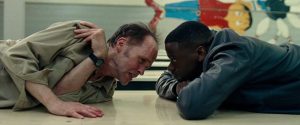 Widows ★★★★
Widows ★★★★
STEVE McQueen’s latest film Widows is a terrific marriage of American and British crime drama.
It’s based on a novel by Lynda La Plante and has twice been turned into a television mini-series. The English author also wrote Prime Suspect, which was also made into a sublime series starring Helen Mirren.
Widows is an interesting choice for McQueen’s first film in five years. On the surface the subject and genre seem a little slight for the man who previously gave us 12 Years A Slave, Shame, and Hunger.
While also being terrific dramas in their own rights, those films delivered powerful messages through examination of deep social themes.
The beauty of Widows is its success on two levels. It can definitely be enjoyed purely as a superior crime drama with dynamic characters, smart dialogue, impressive action sequences and a few nice twists.
But it also provides a strong message of female empowerment, albeit having to break the law in order to break cycles of abuse and manipulation, and examination of the class struggle and moral corruption within politics.
While I recall the main female characters in the original television treatment, English director McQueen and his co-writer, American Gillian Flynn (Gone Girl), appear to have opened up the story and deepened themes with the inclusion of two male politicians as principal characters.
The other aspect to enjoy is that Widows is packed with characters, but every actor is able to make an impact, however short their moment to shine might be.
The film commences brilliantly with visceral action moments from a robbery gone wrong intercut with snippets of back-story showing each of the gang’s relationships with women.
As the tile suggests, four women are left widows with the principal being Veronica who was married to the gang leader Harry Rawlings.
Viola Davis (The Help, Fences) is brilliant as Veronica, whose deep love for Rawlings (Liam Neeson) overshadowed any concerns about his criminal activities.
Complications arise when gang leader Jamal (Brian Tyree Henry) demands that Veronica replace the money that was stolen from him and destroyed in the robbery aftermath.
Jamal needs the money for his local political campaign with a grand plan to seemingly legitimise his businesses while using political power to help build them through manipulation of planning rules.
Jamal, a black man from the projects, is up against a male, white dynasty led by Tom Mulligan and his son Jack, who is Jamal’s direct rival for the coming election.
Colin Farrell (Jack), Robert Duvall (Tom), Henry (Jamal) and Daniel Kayuuya, as Henry’s maverick, sadistic henchman, are all breathtakingly good, either as part of the over-arching story or within a series of sub-plots.
Veronica decides on a radical solution to her problem, bringing together two of the other strong widows, played by Michelle Rodriguez and French/Australian Elizabeth Debicki, along with one of their baby-sitters (Cynthia Erivo), to attempt the next robbery that Harry had planned.
Also part of the cast, in telling small roles, are Jon Bernthal and Australian veteran Jackie Weaver whose main moment takes us back to her great role as the crime matriarch in Animal Kingdom.
McQueen employs his regular cinematographer Sean Bobbitt and editor Joe Walker to deliver some truly inspired sequences. I loved the editing of the opening 10 minutes while the camera angles and movement during a conversation between Farrell’s character and his aide in a vehicle is a master-stroke.
The score is also Hans Zimmer’s best since The Dark Knight and perfectly complements and drives the tension that is forever ramping up on-screen.
One of the best crime dramas of 2018 without doubt.